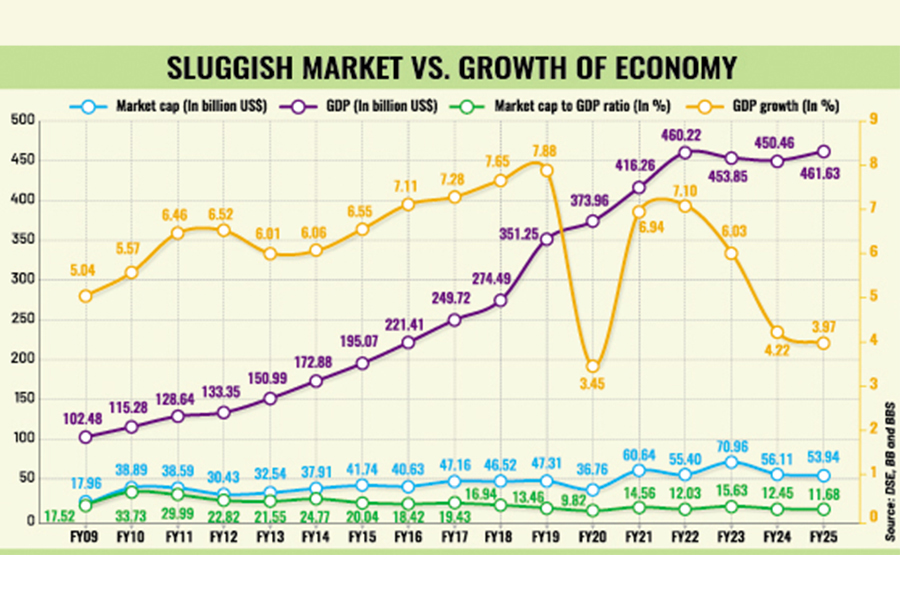
Published :
Updated :

The market cap of the Dhaka Stock Exchange (DSE) is now at its lowest since FY21 amid persistent erosion of equity values and a drought of initial public offerings (IPOs).
That means the new Bangladesh Securities and Exchange Commission (BSEC), after taking over responsibilities, has failed to adopt any policy that could elevate the market.
The DSE's market capitalisation was equivalent to $55.24 billion on Thursday, and the market cap-to-GDP ratio was 11.68 per cent, considering the latest figure of GDP for FY25.
The market cap-to-GDP ratio was 14.56 per cent in FY21.
The DSE's existing market cap includes the market values of 653 listed securities, comprising 360 listed companies and 37 mutual funds. The market cap of only listed companies stood at $25.80 billion on Thursday.
Compared to regional markets such as India and Nepal, Bangladesh has done very poorly while facing the same global economic conditions.
Indian market cap-to-GDP ratio stands at 142 per cent now, while the ratio of Nepal is 76 per cent.
The market cap-to-GDP ratio in India was 80.8 per cent in 2019, which rose to 97.3 per cent in 2020. The ratio gradually rose to a remarkable 133.5 per cent in 2024, according to CEIC Data, a global provider of macroeconomic data for financial and economic analysis.
In the case of Bangladesh, GDP has grown but there is no reflection of that on the market.
"That means the valuation of the existing listed securities severely deteriorated over the last few years," said Md. Ashequr Rahman, managing director of Midway Securities.
The market cap-to-GDP ratio also indicates that the country's capital market has experienced no major developments over the years, he added.
The market cap-to-GDP ratio is a metric that indicates the valuation of the listed securities compared to the entire economy.
If the ratio is falling, it means listed securities, which already have been contributing to the economy, have a lower valuation.
The overall market value of the Dhaka bourse is set to see further erosion following the execution of the merger of five loss-making Islamic banks - First Security Islami Bank, Social Islami Bank, Union Bank, Global Islami Bank and Exim Bank.
Some nine non-performing non-bank financial institutions are also under a process of liquidation. So, the DSE's market-to-GDP ratio will decline significantly in the days to come unless new listed securities are added by the exchange.
Factors behind recent market downturn
The market showed a strong recovery after the fall of the previous government on August 5, 2025, riding on fundamentally strong stocks, mainly those of multinational companies. But the upward momentum soon petered out, and the market turned volatile again.
There were hopes that the economy would rebound after the change of government, which is why investor participation in the secondary market suddenly escalated.
In reality, however, the economy has been going through several inevitable corrective measures, such as the restructuring of the boards of scam-hit banks and the merger of Islamic banks that had been suffering from an acute liquidity crisis.
To tackle inflation, the interim government raised the policy rate, and lending and deposit rates subsequently went up.
Amid all this, gross domestic product rose slightly to $462 billion in FY25 from $450.46 billion the year before. But growth slowed to 3.97 per cent in FY25 from 4.22 per cent in FY24.
Entrepreneurs have been reluctant to expand business as borrowing costs climbed and political uncertainty deepened. Moreover, businesses have been facing inadequate gas and electricity supply alongside heightened insecurity in the industrial belt.
In such a situation, private-sector credit growth hit a historic low of 6.29 per cent in September, while public spending remained low.
Meanwhile, the securities regulator has continued to focus on bringing discipline to the secondary market through amendments to securities rules and penalties imposed on manipulators.
It put revised rules for mutual funds and margin loans into effect last week.
Insiders said the revised margin rules played a role in the recent drastic erosion of market capitalisation, as they required lenders to make adjustments to margin portfolios if client equity fell by 50 per cent, down from the previous threshold of 75 per cent.
While the market has been going through corrections, there have been no positive catalysts.
There had been no initial public offering (IPO) for more than a year before the political changeover, and the new securities commission has not brought any IPO since taking charge.
With hopes fading, investors have also become skeptical about whether the national election will be held as promised in February next year, although the government has continued to reassure the public that it will keep the promise.
mufazzal.fe@gmail.com


 For all latest news, follow The Financial Express Google News channel.
For all latest news, follow The Financial Express Google News channel.